Deck 9: Differential Equations
سؤال
سؤال
سؤال
سؤال
سؤال
سؤال
سؤال
سؤال
سؤال
سؤال
سؤال
سؤال
سؤال
سؤال
سؤال
سؤال
سؤال
سؤال
سؤال
سؤال
سؤال
سؤال
سؤال
سؤال
سؤال
سؤال
سؤال
سؤال
سؤال
سؤال
سؤال
سؤال
سؤال
سؤال
سؤال
سؤال
سؤال
سؤال
سؤال
سؤال
سؤال
سؤال
سؤال
سؤال
سؤال
سؤال
سؤال

فتح الحزمة
قم بالتسجيل لفتح البطاقات في هذه المجموعة!
Unlock Deck
Unlock Deck
1/47
العب
ملء الشاشة (f)
Deck 9: Differential Equations
1
Find an explicit expression for the particular solution that satisfies the given initial condition.
ln
A)
B)
C)
D) y(x) = 3 - ln(x + 2)
ln

A)

B)

C)

D) y(x) = 3 - ln(x + 2)

2
Solve the problem.
The annual sales y of a company are increasing at a rate of $150,000 per year.
A)
B)
C)
D)
The annual sales y of a company are increasing at a rate of $150,000 per year.
A)

B)

C)

D)


3
Solve the problem.
The deer population y in a forest is growing at a rate proportional to the difference between the population and an upper limit of 1500 deer.
A)
B)
C)
D)
The deer population y in a forest is growing at a rate proportional to the difference between the population and an upper limit of 1500 deer.
A)

B)

C)

D)


4
Use the given slope field to graph the particular solutions obtained by letting C = -2, -1, 0, 1, and 2 for the general
solution shown.

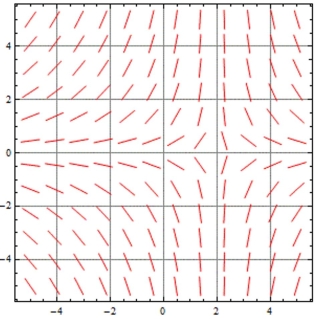
solution shown.



فتح الحزمة
افتح القفل للوصول البطاقات البالغ عددها 47 في هذه المجموعة.
فتح الحزمة
k this deck
5
Use the given slope field to graph the particular solutions obtained by letting C = -2, -1, 0, 1, and 2 for the general
solution shown.

A)
B)
C)
D)
solution shown.

A)

B)

C)

D)


فتح الحزمة
افتح القفل للوصول البطاقات البالغ عددها 47 في هذه المجموعة.
فتح الحزمة
k this deck
6
Use the given slope field to graph the particular solutions obtained by letting C = -2, -1, 0, 1, and 2 for the general
solution shown.
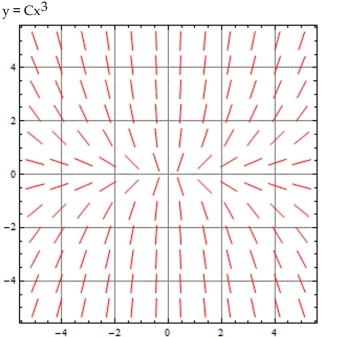
solution shown.


فتح الحزمة
افتح القفل للوصول البطاقات البالغ عددها 47 في هذه المجموعة.
فتح الحزمة
k this deck
7
Use the given slope field to graph the particular solutions obtained by letting C = -2, -1, 0, 1, and 2 for the general
solution shown.

A)
B)
C)
D)
solution shown.

A)

B)

C)

D)


فتح الحزمة
افتح القفل للوصول البطاقات البالغ عددها 47 في هذه المجموعة.
فتح الحزمة
k this deck
8
Solve the problem.
The price p(t) of a produce is assumed to satisfy the differential equation (A) Show that
(A) Show that  is the general solution of this differential equation, and evaluate
is the general solution of this differential equation, and evaluate  (B) Graph the particular solutions that satisfy the initial conditions p(0) = 3 and p(0) = 12.
(B) Graph the particular solutions that satisfy the initial conditions p(0) = 3 and p(0) = 12.
(C) Discuss the long-term behavior of the price of this product.
The price p(t) of a produce is assumed to satisfy the differential equation
 (A) Show that
(A) Show that  is the general solution of this differential equation, and evaluate
is the general solution of this differential equation, and evaluate  (B) Graph the particular solutions that satisfy the initial conditions p(0) = 3 and p(0) = 12.
(B) Graph the particular solutions that satisfy the initial conditions p(0) = 3 and p(0) = 12.(C) Discuss the long-term behavior of the price of this product.

فتح الحزمة
افتح القفل للوصول البطاقات البالغ عددها 47 في هذه المجموعة.
فتح الحزمة
k this deck
9
Determine which of the slope fields (A)-(D) is associated with the given differential equation. Briefly justify your

A)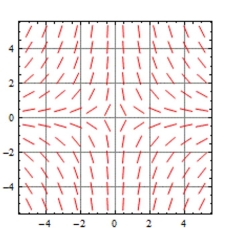
B)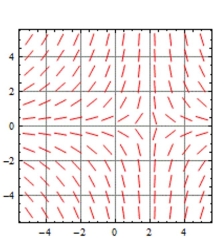
C)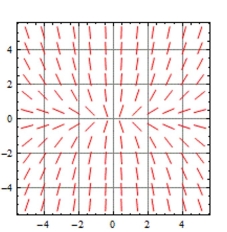
D)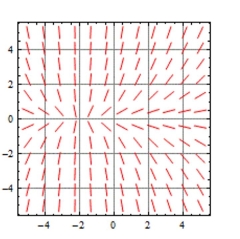

A)

B)

C)

D)


فتح الحزمة
افتح القفل للوصول البطاقات البالغ عددها 47 في هذه المجموعة.
فتح الحزمة
k this deck
10
Solve the problem.
The population N(t) of a certain species of animal in a controlled habitat at time t is assumed to satisfy the
logistic growth model (A) Show that
(A) Show that  is the general solution of this differential equation, and evaluate
is the general solution of this differential equation, and evaluate  (B) Graph the particular solutions that satisfy N(0) = 750 and N(0) = 3000.
(B) Graph the particular solutions that satisfy N(0) = 750 and N(0) = 3000.
(C) Discuss the long-term behavior of this population.
The population N(t) of a certain species of animal in a controlled habitat at time t is assumed to satisfy the
logistic growth model
 (A) Show that
(A) Show that  is the general solution of this differential equation, and evaluate
is the general solution of this differential equation, and evaluate  (B) Graph the particular solutions that satisfy N(0) = 750 and N(0) = 3000.
(B) Graph the particular solutions that satisfy N(0) = 750 and N(0) = 3000.(C) Discuss the long-term behavior of this population.

فتح الحزمة
افتح القفل للوصول البطاقات البالغ عددها 47 في هذه المجموعة.
فتح الحزمة
k this deck
11
Use the general solution y of the differential equation to find a particular solution that satisfies the indicated initial
condition. Graph the particular solutions for x ≥ 0.

condition. Graph the particular solutions for x ≥ 0.


فتح الحزمة
افتح القفل للوصول البطاقات البالغ عددها 47 في هذه المجموعة.
فتح الحزمة
k this deck
12
Use the given slope field to graph the particular solutions obtained by letting C = -2, -1, 0, 1, and 2 for the general
solution shown.

A)
B)
C)
D)
solution shown.

A)

B)

C)

D)


فتح الحزمة
افتح القفل للوصول البطاقات البالغ عددها 47 في هذه المجموعة.
فتح الحزمة
k this deck
13
Show that the technique of separation of variables is applicable by writing the differential equation in the form  =
=
g(x).

A)
B)
C)
D)
 =
=g(x).

A)

B)

C)

D)


فتح الحزمة
افتح القفل للوصول البطاقات البالغ عددها 47 في هذه المجموعة.
فتح الحزمة
k this deck
14
Find the general solution for the differential equation. Then find the particular solution satisfying the initial condition.

A)
B)
C)
D)

A)

B)

C)

D)


فتح الحزمة
افتح القفل للوصول البطاقات البالغ عددها 47 في هذه المجموعة.
فتح الحزمة
k this deck
15
Show that the technique of separation of variables is applicable by writing the differential equation in the form  =
=
g(x).

A)
B)
C)
D)
 =
=g(x).

A)

B)

C)

D)


فتح الحزمة
افتح القفل للوصول البطاقات البالغ عددها 47 في هذه المجموعة.
فتح الحزمة
k this deck
16
Use the general solution y of the differential equation to find a particular solution that satisfies the indicated initial
condition. Graph the particular solutions for x ≥ 0.

condition. Graph the particular solutions for x ≥ 0.


فتح الحزمة
افتح القفل للوصول البطاقات البالغ عددها 47 في هذه المجموعة.
فتح الحزمة
k this deck
17
Determine which of the slope fields (A)-(D) is associated with the given differential equation. Briefly justify your

A)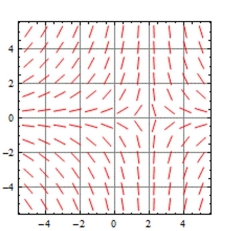
B)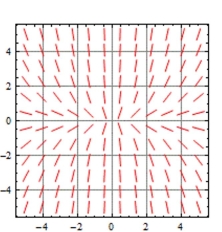
C)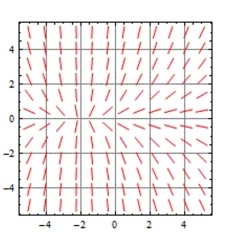
D)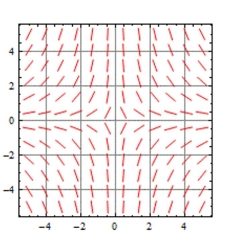

A)

B)

C)

D)


فتح الحزمة
افتح القفل للوصول البطاقات البالغ عددها 47 في هذه المجموعة.
فتح الحزمة
k this deck
18
Find an explicit expression for the particular solution that satisfies the given initial condition.

A)
B)
C)
D)

A)

B)

C)

D)


فتح الحزمة
افتح القفل للوصول البطاقات البالغ عددها 47 في هذه المجموعة.
فتح الحزمة
k this deck
19
Use the general solution y of the differential equation to find a particular solution that satisfies the indicated initial
condition.

condition.


فتح الحزمة
افتح القفل للوصول البطاقات البالغ عددها 47 في هذه المجموعة.
فتح الحزمة
k this deck
20
Use the general solution y of the differential equation to find a particular solution that satisfies the indicated initial
condition. Graph the particular solutions for x ≥ 0.
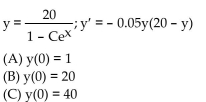
condition. Graph the particular solutions for x ≥ 0.


فتح الحزمة
افتح القفل للوصول البطاقات البالغ عددها 47 في هذه المجموعة.
فتح الحزمة
k this deck
21
Solve the problem.
A culture of bacteria is growing in a medium that can support a maximum of 1,500 bacteria. The rate of change of the number of bacteria is proportional to the product of the number present and the difference between 1,500 and the
Number present. The culture initially contains 250 bacteria. After 1 hour, there are 350 bacteria.
a. How many bacteria are present after 3 hours? Round to the nearest whole number as needed.
b. When will the culture contain 1,250 bacteria? Round to the nearest tenth as needed.
A) a.) 620 bacteria b.) 7.7 hours
B) a.) 1,125 bacteria b.) 6.7 hours
C) a.) 1,750 bacteria b.) 10.2 hours
D) a.) 850 bacteria b.) 5.2 hours
A culture of bacteria is growing in a medium that can support a maximum of 1,500 bacteria. The rate of change of the number of bacteria is proportional to the product of the number present and the difference between 1,500 and the
Number present. The culture initially contains 250 bacteria. After 1 hour, there are 350 bacteria.
a. How many bacteria are present after 3 hours? Round to the nearest whole number as needed.
b. When will the culture contain 1,250 bacteria? Round to the nearest tenth as needed.
A) a.) 620 bacteria b.) 7.7 hours
B) a.) 1,125 bacteria b.) 6.7 hours
C) a.) 1,750 bacteria b.) 10.2 hours
D) a.) 850 bacteria b.) 5.2 hours

فتح الحزمة
افتح القفل للوصول البطاقات البالغ عددها 47 في هذه المجموعة.
فتح الحزمة
k this deck
22
Find the general solution for the differential equation. Then find the particular solution satisfying the initial condition.

A)
B)
C)
D)

A)

B)

C)

D)


فتح الحزمة
افتح القفل للوصول البطاقات البالغ عددها 47 في هذه المجموعة.
فتح الحزمة
k this deck
23
Find the integrating factor, the general solution, and the particular solution satisfying the given initial condition.

A)
B)
C)
D)

A)

B)

C)

D)


فتح الحزمة
افتح القفل للوصول البطاقات البالغ عددها 47 في هذه المجموعة.
فتح الحزمة
k this deck
24
Replace the ? with a function of x that will make the integrand equal to the derivative of a product, and then find the
antiderivative. Choose 0 for the constant of integration.

A)
B)
C)
D)
antiderivative. Choose 0 for the constant of integration.

A)

B)

C)

D)


فتح الحزمة
افتح القفل للوصول البطاقات البالغ عددها 47 في هذه المجموعة.
فتح الحزمة
k this deck
25
Find the general solution for the differential equation. Do not attempt to find an explicit expression for the solution.

A)
B)
C)
D)

A)

B)

C)

D)


فتح الحزمة
افتح القفل للوصول البطاقات البالغ عددها 47 في هذه المجموعة.
فتح الحزمة
k this deck
26
Is the differential equation first-order linear? If so, find f(x) and g(x) so that the equation can be expressed in standard  + f(x)y = g(x).
+ f(x)y = g(x).

A)
B)
C) No
D)
 + f(x)y = g(x).
+ f(x)y = g(x).
A)

B)

C) No
D)


فتح الحزمة
افتح القفل للوصول البطاقات البالغ عددها 47 في هذه المجموعة.
فتح الحزمة
k this deck
27
Find the integrating factor I(x) for each equation, and then find the general solution.

A)
B)
C)
D)

A)

B)

C)

D)


فتح الحزمة
افتح القفل للوصول البطاقات البالغ عددها 47 في هذه المجموعة.
فتح الحزمة
k this deck
28
Find the integrating factor, the general solution, and the particular solution satisfying the given initial condition.

A)
B)
C)
D)

A)

B)

C)

D)


فتح الحزمة
افتح القفل للوصول البطاقات البالغ عددها 47 في هذه المجموعة.
فتح الحزمة
k this deck
29
Replace the ? with a function of x that will make the integrand equal to the derivative of a product, and then find the
antiderivative. Choose 0 for the constant of integration.

A)
B)
C)
D)
antiderivative. Choose 0 for the constant of integration.

A)

B)

C)

D)


فتح الحزمة
افتح القفل للوصول البطاقات البالغ عددها 47 في هذه المجموعة.
فتح الحزمة
k this deck
30
Find an explicit expression for the particular solution for the differential equation.

A)
B)
C)
D)

A)

B)

C)

D)


فتح الحزمة
افتح القفل للوصول البطاقات البالغ عددها 47 في هذه المجموعة.
فتح الحزمة
k this deck
31
Find the general solution for the differential equation. Then find the particular solution satisfying the initial condition.
y
A)
B)
C)
D)
y

A)

B)

C)

D)


فتح الحزمة
افتح القفل للوصول البطاقات البالغ عددها 47 في هذه المجموعة.
فتح الحزمة
k this deck
32
Find the general solution for the differential equation. Then find the particular solution satisfying the initial condition.

A)
B)
C)
D)

A)

B)

C)

D)


فتح الحزمة
افتح القفل للوصول البطاقات البالغ عددها 47 في هذه المجموعة.
فتح الحزمة
k this deck
33
Solve the problem.
A bank offers a certificate of deposit that earns 4.5% interest compounded continuously. How much will a $4,000 investment be worth in 10 years? Round to the nearest cent as needed.
A) $4,200.00
B) $4,180.00
C) $6,273.25
D) $5,967.30
A bank offers a certificate of deposit that earns 4.5% interest compounded continuously. How much will a $4,000 investment be worth in 10 years? Round to the nearest cent as needed.
A) $4,200.00
B) $4,180.00
C) $6,273.25
D) $5,967.30

فتح الحزمة
افتح القفل للوصول البطاقات البالغ عددها 47 في هذه المجموعة.
فتح الحزمة
k this deck
34
Solve the problem.
A company wishes to analyze a new room deodorizer. The active ingredient evaporates at a rate proportional to the amount present. One third of the ingredient evaporates in the first 20 days after the deodorizer is installed. If
The deodorizer becomes ineffective after 85% of the active ingredient has evaporated, how long will one of these
Deodorizers remain effective? Round to the nearest whole number as needed.
A) 26 days
B) 45 days
C) 94 days
D) 100 days
A company wishes to analyze a new room deodorizer. The active ingredient evaporates at a rate proportional to the amount present. One third of the ingredient evaporates in the first 20 days after the deodorizer is installed. If
The deodorizer becomes ineffective after 85% of the active ingredient has evaporated, how long will one of these
Deodorizers remain effective? Round to the nearest whole number as needed.
A) 26 days
B) 45 days
C) 94 days
D) 100 days

فتح الحزمة
افتح القفل للوصول البطاقات البالغ عددها 47 في هذه المجموعة.
فتح الحزمة
k this deck
35
Find the integrating factor, the general solution, and the particular solution satisfying the given initial condition.

A)
B)
C)
D)

A)

B)

C)

D)


فتح الحزمة
افتح القفل للوصول البطاقات البالغ عددها 47 في هذه المجموعة.
فتح الحزمة
k this deck
36
Is the differential equation first-order linear? If so, find f(x) and g(x) so that the equation can be expressed in standard  + f(x)y = g(x).
+ f(x)y = g(x).

A) Yes; f(x) = kx and g(x) = 0
B) Yes; f(x) = 0 and g(x) = kx
C) No
D) Yes; f(x) = 1 and g(x) = kx
 + f(x)y = g(x).
+ f(x)y = g(x).
A) Yes; f(x) = kx and g(x) = 0
B) Yes; f(x) = 0 and g(x) = kx
C) No
D) Yes; f(x) = 1 and g(x) = kx

فتح الحزمة
افتح القفل للوصول البطاقات البالغ عددها 47 في هذه المجموعة.
فتح الحزمة
k this deck
37
Find the integrating factor, the general solution, and the particular solution satisfying the given initial condition.

A)
B)
C)
D)

A)

B)

C)

D)


فتح الحزمة
افتح القفل للوصول البطاقات البالغ عددها 47 في هذه المجموعة.
فتح الحزمة
k this deck
38
Replace the ? with a function of x that will make the integrand equal to the derivative of a product, and then find the
antiderivative. Choose 0 for the constant of integration.

A)
B)
C)
D)
antiderivative. Choose 0 for the constant of integration.

A)

B)

C)

D)


فتح الحزمة
افتح القفل للوصول البطاقات البالغ عددها 47 في هذه المجموعة.
فتح الحزمة
k this deck
39
Find an explicit expression for the particular solution for the differential equation.

A)
B)
C)
D)

A)

B)

C)

D)


فتح الحزمة
افتح القفل للوصول البطاقات البالغ عددها 47 في هذه المجموعة.
فتح الحزمة
k this deck
40
Find the general solution for the differential equation. Do not attempt to find an explicit expression for the solution.

A)
B)
C)
D)

A)

B)

C)

D)


فتح الحزمة
افتح القفل للوصول البطاقات البالغ عددها 47 في هذه المجموعة.
فتح الحزمة
k this deck
41
Solve the problem.
An initial deposit of $45,000 is made into an account that earns 5.4% compounded continuously. Money is then withdrawn at a constant rate of $2,700 a year until the amount in the account is 0. Find the amount in the
Account at any time t. When is the amount 0? What is the total withdrawn from the account?
A) . The account will be depleted after about 35.1 years. A total of about $94,770 will have been withdrawn at that time.
. The account will be depleted after about 35.1 years. A total of about $94,770 will have been withdrawn at that time.
B) . The account will be depleted after about 42.6 years. A total of about $115,130 will have been withdrawn at that time.
. The account will be depleted after about 42.6 years. A total of about $115,130 will have been withdrawn at that time.
C) . The account will be depleted after about 15.4 years. A total of about $41,580 will have been withdrawn at that time.
. The account will be depleted after about 15.4 years. A total of about $41,580 will have been withdrawn at that time.
D) . The account will be depleted after about 20.5 years. A total of about $55,350 will have been withdrawn at that time.
. The account will be depleted after about 20.5 years. A total of about $55,350 will have been withdrawn at that time.
An initial deposit of $45,000 is made into an account that earns 5.4% compounded continuously. Money is then withdrawn at a constant rate of $2,700 a year until the amount in the account is 0. Find the amount in the
Account at any time t. When is the amount 0? What is the total withdrawn from the account?
A)
 . The account will be depleted after about 35.1 years. A total of about $94,770 will have been withdrawn at that time.
. The account will be depleted after about 35.1 years. A total of about $94,770 will have been withdrawn at that time.B)
 . The account will be depleted after about 42.6 years. A total of about $115,130 will have been withdrawn at that time.
. The account will be depleted after about 42.6 years. A total of about $115,130 will have been withdrawn at that time.C)
 . The account will be depleted after about 15.4 years. A total of about $41,580 will have been withdrawn at that time.
. The account will be depleted after about 15.4 years. A total of about $41,580 will have been withdrawn at that time.D)
 . The account will be depleted after about 20.5 years. A total of about $55,350 will have been withdrawn at that time.
. The account will be depleted after about 20.5 years. A total of about $55,350 will have been withdrawn at that time.
فتح الحزمة
افتح القفل للوصول البطاقات البالغ عددها 47 في هذه المجموعة.
فتح الحزمة
k this deck
42
Find the integrating factor I(x) for each equation, and then find the general solution.

A)
B)
C)
D)

A)

B)

C)

D)


فتح الحزمة
افتح القفل للوصول البطاقات البالغ عددها 47 في هذه المجموعة.
فتح الحزمة
k this deck
43
Solve the problem.
A 1000-gallon holding tank contains 100 gallons of water. Initially, each gallon of water in the tank contains 3 pounds of pollutants. Water containing 4 pounds of pollutants per gallon enters the tank at a rate of 50 gallons
Per hour, and the uniformly mixed water is released from the tank at a rate of 25 gallons per hour. How many
Pounds of pollutants are in the tank after 4 hours? At what rate (in pounds per gallon) are the pollutants being
Released after 4 hours?
A) There are 250 pounds of pollutants in the tank after 4 hours. The pollutants are being released at a rate of 1.25 pounds per gallon after 4 hours.
B) There are 650 pounds of pollutants in the tank after 4 hours. The pollutants are being released at a rate of 5.75 pounds per gallon after 4 hours.
C) There are 180 pounds of pollutants in the tank after 4 hours. The pollutants are being released at a rate of 4.35 pounds per gallon after 4 hours.
D) There are 750 pounds of pollutants in the tank after 4 hours. The pollutants are being released at a rate of 3.75 pounds per gallon after 4 hours.
A 1000-gallon holding tank contains 100 gallons of water. Initially, each gallon of water in the tank contains 3 pounds of pollutants. Water containing 4 pounds of pollutants per gallon enters the tank at a rate of 50 gallons
Per hour, and the uniformly mixed water is released from the tank at a rate of 25 gallons per hour. How many
Pounds of pollutants are in the tank after 4 hours? At what rate (in pounds per gallon) are the pollutants being
Released after 4 hours?
A) There are 250 pounds of pollutants in the tank after 4 hours. The pollutants are being released at a rate of 1.25 pounds per gallon after 4 hours.
B) There are 650 pounds of pollutants in the tank after 4 hours. The pollutants are being released at a rate of 5.75 pounds per gallon after 4 hours.
C) There are 180 pounds of pollutants in the tank after 4 hours. The pollutants are being released at a rate of 4.35 pounds per gallon after 4 hours.
D) There are 750 pounds of pollutants in the tank after 4 hours. The pollutants are being released at a rate of 3.75 pounds per gallon after 4 hours.

فتح الحزمة
افتح القفل للوصول البطاقات البالغ عددها 47 في هذه المجموعة.
فتح الحزمة
k this deck
44
Find the general solution two ways. First use an integrating factor and then use separation of variables.

A)
B)
C)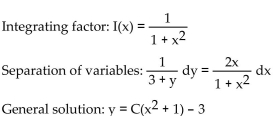
D)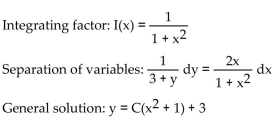

A)

B)

C)

D)


فتح الحزمة
افتح القفل للوصول البطاقات البالغ عددها 47 في هذه المجموعة.
فتح الحزمة
k this deck
45
Find the integrating factor I(x) for each equation, and then find the general solution.

A)
B)
C)
D)

A)

B)

C)

D)


فتح الحزمة
افتح القفل للوصول البطاقات البالغ عددها 47 في هذه المجموعة.
فتح الحزمة
k this deck
46
Find the general solution two ways. First use an integrating factor and then use separation of variables.

A)
B)
C)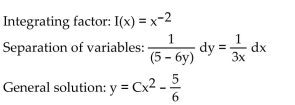
D)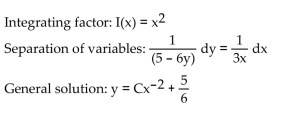

A)

B)

C)

D)


فتح الحزمة
افتح القفل للوصول البطاقات البالغ عددها 47 في هذه المجموعة.
فتح الحزمة
k this deck
47
Solve the problem.
The supply S and demand D for a certain commodity satisfy the equations ) and
) and  find the equilibrium price p at time t and the long-range equilibrium price.
find the equilibrium price p at time t and the long-range equilibrium price.
A)
B)
C)
D)
The supply S and demand D for a certain commodity satisfy the equations
 ) and
) and  find the equilibrium price p at time t and the long-range equilibrium price.
find the equilibrium price p at time t and the long-range equilibrium price.A)

B)

C)

D)


فتح الحزمة
افتح القفل للوصول البطاقات البالغ عددها 47 في هذه المجموعة.
فتح الحزمة
k this deck








